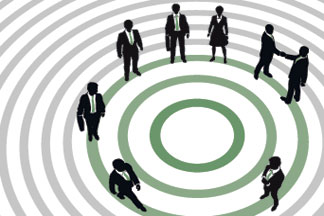 I just came from a business luncheon of the local Chamber of Commerce in Maplewood, N.J. This particular lunch saw a pretty good turnout. There was a scattering of real estate agents, a couple of bankers, restaurant owners, representatives of two different community publications (online and print), the local librarian, hair stylists, a few consultants like me, and a handful of newly unemployed looking to get back in the game.
I just came from a business luncheon of the local Chamber of Commerce in Maplewood, N.J. This particular lunch saw a pretty good turnout. There was a scattering of real estate agents, a couple of bankers, restaurant owners, representatives of two different community publications (online and print), the local librarian, hair stylists, a few consultants like me, and a handful of newly unemployed looking to get back in the game.
Notice I didn't say “insurance agents.” There weren't any this time, but there have been in the past, mostly captive agent types.
The speaker was a local businessman who has run the gamut from corporate executive to small business owner of a popular fish store to now a business consultant. His presented on what makes great companies. In preparation for his presentation, we were all asked to watch an 18-minute video by Simon Sinek, author, marketing consultant and popular speaker on the TEDTalks.com series.
Recommended For You
Want to continue reading?
Become a Free PropertyCasualty360 Digital Reader
Your access to unlimited PropertyCasualty360 content isn’t changing.
Once you are an ALM digital member, you’ll receive:
- Breaking insurance news and analysis, on-site and via our newsletters and custom alerts
- Weekly Insurance Speak podcast featuring exclusive interviews with industry leaders
- Educational webcasts, white papers, and ebooks from industry thought leaders
- Critical converage of the employee benefits and financial advisory markets on our other ALM sites, BenefitsPRO and ThinkAdvisor
Already have an account? Sign In Now
© Touchpoint Markets, All Rights Reserved. Request academic re-use from www.copyright.com. All other uses, submit a request to [email protected]. For more inforrmation visit Asset & Logo Licensing.







